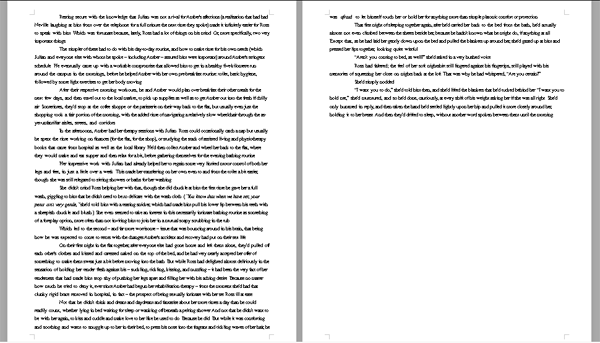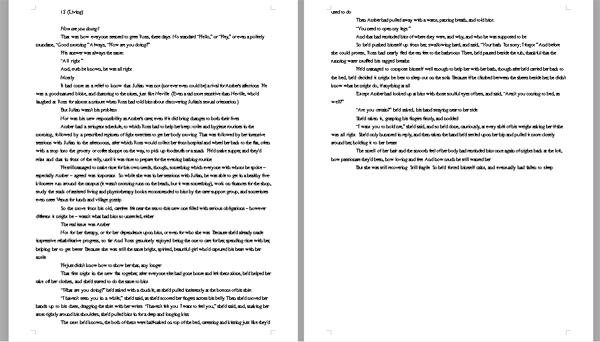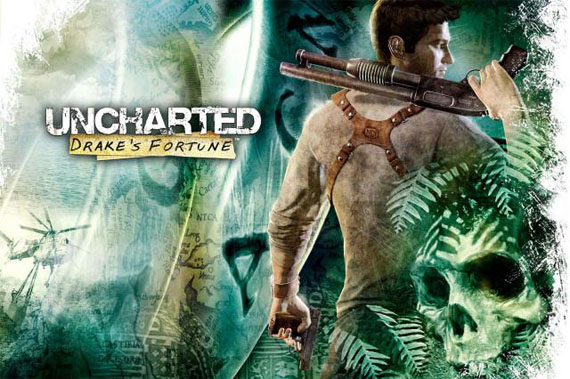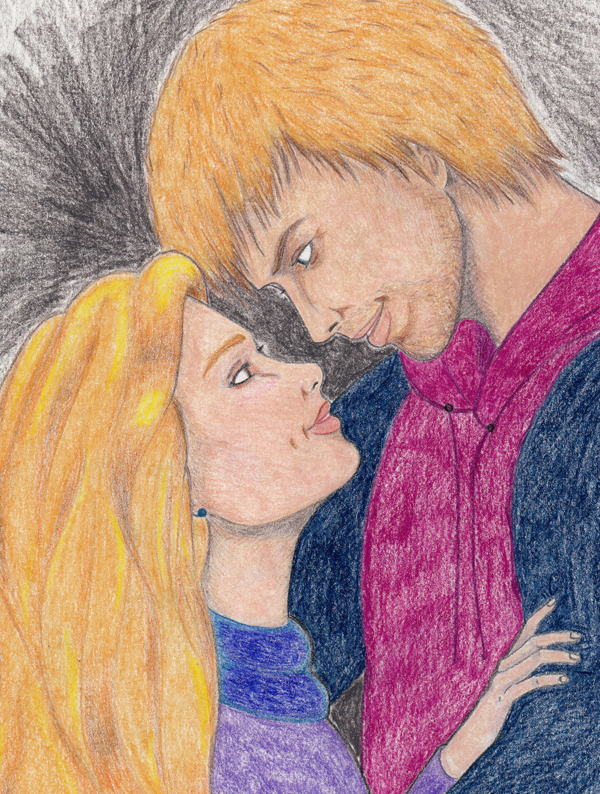by Mayumi-H | Jul 4, 2012 | Persona 4 Fan Fiction, Short Stories

I had quite a bit of fun with last week’s picture prompt; my head certainly went in a new direction from where I’d been before!
But the 100-Word Challenge for Grown-Ups this week (week 48) is a phrase prompt:
… I blamed it on the dog…
Julia says: “Your pieces should be 106 words long (the prompt plus 100).” Without further ado, here’s what I’m offering, this week:
“Blame the Hound”
“That girl definitely knows what she’s doing, let me tell you…!”
“Who? Anna?”
“No. Juliet.”
“Juliet? I thought you were out with Anna, last night?”
“Canceled.”
“She canceled?”
“No, I canceled. Keep up, would you, mate?”
“Why’d you cancel?”
“Have you seen Juliet?”
“So, what? Anna’s history, then?”
“Why would you say that?”
“Because you went out with another girl last night, that’s why!”
“It’s not like I told her I was going out with another bird, moron.”
“So, then, what was your excuse for not taking her out last night?”
“I blamed it on the dog.”
“You don’t have a dog.”
“She doesn’t know that!”
Another dialogue-only piece; sorry about that. Again, I didn’t see the need for any description; I think the words speak for themselves.
Personally, I appreciate a man who is faithful, kindly, sweet…all that good stuff. Yet, it’s fun to imagine the life of a hound. (You know, just so long as it’s all in my imagination!)
![256px-Pharaoh_Hound By kallerna (Own work) [Public domain], via Wikimedia Commons](https://mayumi.amorphous.press/wp-content/uploads/sites/4/2012/08/256px-pharaoh_hound1.jpg)
What did you blame on the dog, this week?
by Mayumi-H | Jun 4, 2012 | Fearless, Persona 4 Fan Fiction, Process
I read somewhere that it can be helpful to take a step back and just look at your work. Not from an artistic perspective or a storytelling or an editing one, but from a visual one. The idea is that, if every page looks the same (whether it’s big blocks of text or lots of lines of dialogue), you may need to switch up your storytelling style a bit. It’s just another subtle way of keeping your readers’ attention, I guess.
So, on a recent revision of my manuscript, that’s what I did. I took a step back, and looked at the first page and a half of a chapter.
I have to point out, here, that the reason I did this was because I was leery about starting another chapter with a lot of textual explanation, as I’d done the last chapter. Anyway, here’s what the initial draft looked like:

The original start to Chapter 15.
Whoa. What a wall of text. It’s necessary text, though. There’s a fair amount of explanation that happens, to set up the minor conflict of this chapter. But there’s already a lot of description and setup that happens in the surrounding chapters, and I didn’t want to subject the reader to having to read these huge intros every time.
So, here’s the second draft:

The revised Chapter 15 start. Looks nicer, yes?
All I did differently was break up the blocks of description and explanation with some more personal insight from my main character, answering questions from other people. The same information is offered, but it’s broken up into what I consider more manageable pieces.
And, doesn’t it look a little nicer to read, too?
I’m not afraid to read lush description, but sometimes you just need to change it up, for sake of your reader’s eyes. What about you? Would that wall of text have scared you off? Do you find it helpful to look at your stories in a visual way?
by Mayumi-H | Apr 23, 2012 | Fearless, Persona 4 Fan Fiction, Short Stories, Uncategorized
My entry to the 200-word Flash Fiction Contest over at Joey Francisco’s Soul and Sweet Tea blog…which you should go and check out, because it’s chock-full of creative goodness! My only regret is that I’m only finding her site now, and so I have so much to catch up on!
I took my prompt from Ms. Francisco’s photograph of the watchtower at Fort Matanzas:

Fort Matanzas, photo by Joey Francisco. Used without permission.
Stone stairs and the blood of Landstanders foolish enough to raise arms against him disappear beneath Fin’s boots, as every step takes him closer to the top of this tall, windowed tower, and to the girl trapped within.
“Wavewalker!” a guard warns, but he’s silenced by metal tines already streaked red; it’s the same for his partner beside. And up Fin runs, never stopping.
His muscles ache, his lungs burn, but the door is just ahead, and suddenly he’s crying her name as his spear splinters the heavy wood:
“Cauda!”
He’s barely broken through when she rushes up, arms thrown around him. And though her eyes are wide and frightened, her voice drifts to him with such gentle love, like the dreamy sway of the coral among which they used to swim. “You came.”
Time is short – more Landstanders are surely already racing to reclaim their princess prize – but still he cups her face, so sea-pale and soft, and kisses her, for fear it will be the last thing he ever does.
He draws back at the taste of tears.
“There’s no way out,” she whispers.
The spear creaks in his fist. “There’s always a way.”
As per the instructions, I stayed within the 200-word limit (mine comes in at 198 words), and I didn’t think too much about plot or craft. I just wrote.
I don’t usually jump for contests. And, to be honest, it’s not really the contest that interested me, in this case. I’ve just been having such fun playing in the 100-Word Challenges for Grown-Ups over at Julia’s Place that, when this came up in my Twitter feed via @speechwriterguy, I had to see if I could write something a little bit different than what I’ve been doing with the 100-Word Challenges.
This fantasy conflict is actually one of the earliest plot ideas I had for what became Fearless, believe it or not. It never went further than a very basic and archetypal idea of princesses and warriors, of course, and the more realistic, personal love story between Ross and Amber won out for me, in the end. But it was quite a bit of fun to revisit, in a way, those original concepts, here. And, who knows? Maybe I will flesh out the conflict between the Wavewalkers and Landstanders, one day.
by Mayumi-H | Apr 18, 2012 | Fearless, Persona 4 Fan Fiction, Short Stories
 This week’s prompt for the 100 Word Challenge for Grown-Ups was to write a sonnet, in recognition of arguably the most famous sonneteer in history, William Shakespeare. The specifics of the prompt are as follows:
This week’s prompt for the 100 Word Challenge for Grown-Ups was to write a sonnet, in recognition of arguably the most famous sonneteer in history, William Shakespeare. The specifics of the prompt are as follows:
Your mission, should you wish to take it up, is a BIG one. We are going to celebrate the Bard by writing sonnets! I can see some frowns! Don’t worry it will stretch your creativity.
- You MUST write 14 lines (this is the minimum)
- You can use 10 syllables per line (choice)
- You could use the following rhythm – a-b-a-b, c-d-c-d, e-f-e-f, g-g. (choice)
So, the least you have to do is write 14 lines. Limit is around 100 words. You may need to go over slightly if you choose to do 2 and 3. The topic is of your choice but of course if you fancy including George and that dragon he is supposed to have slayed then feel free!
Writing my Fearless protagonists, I’ve decided that I can’t turn down a challenge when it arises, either. So, here is my offering:
“Daddy and the Dragon”

Image courtesy of the Royal Society of St. George
http://www.royalsocietyofstgeorge.com/stgeorge.htm
Atop the sofa, clad in argent satin,
St. George and sword rise tall and full of might
To face the horrid, furious dragon,
And keep all tiny children safe at night.
One cheers, one gasps, as Mummy tells the tale
Of fabled times and ancient beasts most foul,
While Daddy swings the sword and clashes mail,
To play St. George and make the dragon howl.
But with a whoosh! and whack!, he seems to fall,
And both girls cry for his recovery.
So Mummy urges help, however small,
With clap and laughter, bringing victory.
Then kisses come; the toys are put away.
But George and beast will fight another day.
…So, a poet I’m not. 🙂 Still, this was a fun exercise.
It’s been ages since I’ve tried anything within such a confining structure as iambic pentameter. I did cheat a bit, as you can see, but I wanted to tell a story, rather than just writing a love sonnet. (Besides, no one will ever be as successful at the love sonnet as William Shakespeare. Or Kermit the Frog.)
[youtube http://www.youtube.com/watch?v=WT1p3KyaW-I&w=420&h=315]
As a lovestruck young woman, I tried to write poetry, of course, as most teenagers do. But it just wasn’t happening. The product of those candlelit writing sessions is the main reason why I long ago gave up on being a poet of any kind.
I went back and forth on what I wanted to write for this subject…but, as usually happens, my initial idea is the one that ended up working best. You may not agree (I didn’t say it was a great effort, just my personal best). But, no one can fault me for being a little bit fearless.
by Mayumi-H | Apr 2, 2012 | Excerpts, Fearless, Persona 4 Fan Fiction, Process
Neville scowled at the doctor’s back. “Twat,” he muttered.
Venus snorted in mild amusement. “All doctors are twats,” she told him. “It comes with the territory. But he’s good,” she murmured, now. “Very good. And well-respected around here. And Amber’s his patient, so they’re more likely to release information to him than to an off-duty nurse,” she added with a shallow shrug.
Ross offered her a smile that he didn’t quite fully feel but managed anyway. “I’d still rather have you here,” he said.
Venus smiled up at him, and reached out to rub her hand over his back. “Thanks, duckie,” she murmured, and he hugged her close for a second in reply. She gave him a returning quick squeeze and sighed. Then she led him back to the chairs against the wall, to sit and sip at their coffee, and wait.
The coffee wasn’t particularly good. It was too bitter and too sweet at the same time, reminding Ross of nothing so much as one morning barely three weeks ago, when Amber had tried her hand at using Freddie’s French press. She’d gotten the balance of grounds to water wrong – or something – and had tried to cover it up with copious amounts of milk and sugar, with less than poor results. The hot mess had ended up tasting so sludgy and so burnt and so utterly terrible that Ross had made her promise never to make coffee again, despite how much she’d protested that she only needed some practice, and if he’d let her try again, she was sure she could do it right.
He would have given anything to be drinking her coffee, now. To have her standing next to him with that cautiously inquiring smile she would use when she was seeking his favour, the one that made one side of her mouth curl up hopefully, pressing one dimple into her cheek. And to feel her cuddle guardedly close, tucked almost under his shoulder, with her hair smelling so clean and her arms already wound mostly around him, itching to hug him when he finally smiled at her.
He pressed his face into the palm of one hand, focusing firmly on his breathing because anything else was simply too difficult to do.
I admit it: I enjoy writing stories in arcs. I like seeing characters through one adventure or crisis for a few chapters, lead them to a resolution, give them a little bit of downtime, and then slap them in the face with a new crisis. I like my videogames and movies and books to do the same thing, for the most part.
Naughty Dog’s “Uncharted” series of games is a good example of what I’m talking about. (There are others, of course. I just like looking at Nate Drake, the protagonist of the series, best.)

Nate's back!
...and, oh, what a back it is!
The hero (Nate Drake, whom the player controls through the game) bounces from one location to the next, finding clues to the over-arching mystery adventure, which usually involves shoot-outs, corporate thievery, hanging from ledges, and the occasional romantic entanglement. Each point on the adventure map has its own little story, mystery, and climax, but they all contribute to the whole. You can set down the game after each mini-adventure, as it were, and take a breather, before you jump headlong into the next one. (Nate always jumps headlong into everything. It’s a character trait.)
I – and this is just me, personally – like stories structured the same way. If it’s a constant uphill rise or battle toward one grandiose climax, I get tired reading that (or watching it, or playing it). There’s no time for me to relax. For some genres, of course, that can be a good thing, I suppose. In a thriller, you might want to never let up on the tension. (I can’t imagine anyone surviving very long in a story like that, but I’m digressing.) But in a romance/drama/relationship story, which is what I’m writing, I think it’s worth it to the reader to see the characters get some happy time before the next bus comes crashing into the building.
And there are buses. Emotional ones and physical. Because all stories need some conflict.
What does all of this have to do with the excerpt above? I guess I just thought that you were seeing a lot of happy-happy, and I wanted to let you know that the story does actually have some meat to it. Emotional meat. Heavy emotional meat. But there’s an end coming for that, too. You just have to see it through.
by Mayumi-H | Mar 2, 2012 | Persona 4 Fan Fiction, Songbirds, Uncategorized
“Adaptation” is a short Doctor Who–lite story I wrote for the one-off characters of Sally Sparrow and Larry Nightingale, as presented in the television series episode “Blink” (Series 3, episode 10).

Nothing like a romantic little one-off, eh?
I fell in love with this pairing almost immediately, and I’ve written about them more than once. “Adaptation” was my attempt at drawing parallels between classic literature and personal relationships.
It’s not often that readers entirely “get” what I’m trying to do with my stories…but, sometimes (occasionally; rarely), a sharp, clever reader will absolutely nail it. The feeling of elation I get when that happens can last me for days.
Reader Rokesmith wrote:
This is my favourite of your Songbirds stories. It says such wonderful things about these two incidental characters and the relationship that sadly we only got a glimpse of. But mainly, I like it for what it says about relationships, Sally’s slow uncovering of Larry’s deep rooted insecurities about how an introverted geek is supposed to maintain a relationship with a bright, beautiful girl with whom he shares very few interests. This is something I imagine a lot of geeks find themselves confronted with in relationships at some stage, which is why the resolution is so touching: Sally’s gentle but inescapable affirmation that no matter what their differences in interests and dreams, they love each other and that’s what’s important. And it’s all brilliantly tied together by a comparison to ‘Sense and Sensibility’ that fits so well with Sally herself. A perfect meeting of Doctor Who, classic literature and compelling romance, which is everything this pair should be.
Of all of my fan fiction outings, I think I love my Songbirds series the best. It’s not nearly the most popular, either for the pairing or in general, but the stories are very simply about two people romantically entwined. There’s no grand adventure they undertake, beyond that of life and love. Though, in some ways, that’s the best adventure of them all.


![256px-Pharaoh_Hound By kallerna (Own work) [Public domain], via Wikimedia Commons](https://mayumi.amorphous.press/wp-content/uploads/sites/4/2012/08/256px-pharaoh_hound1.jpg)







Recent Comments